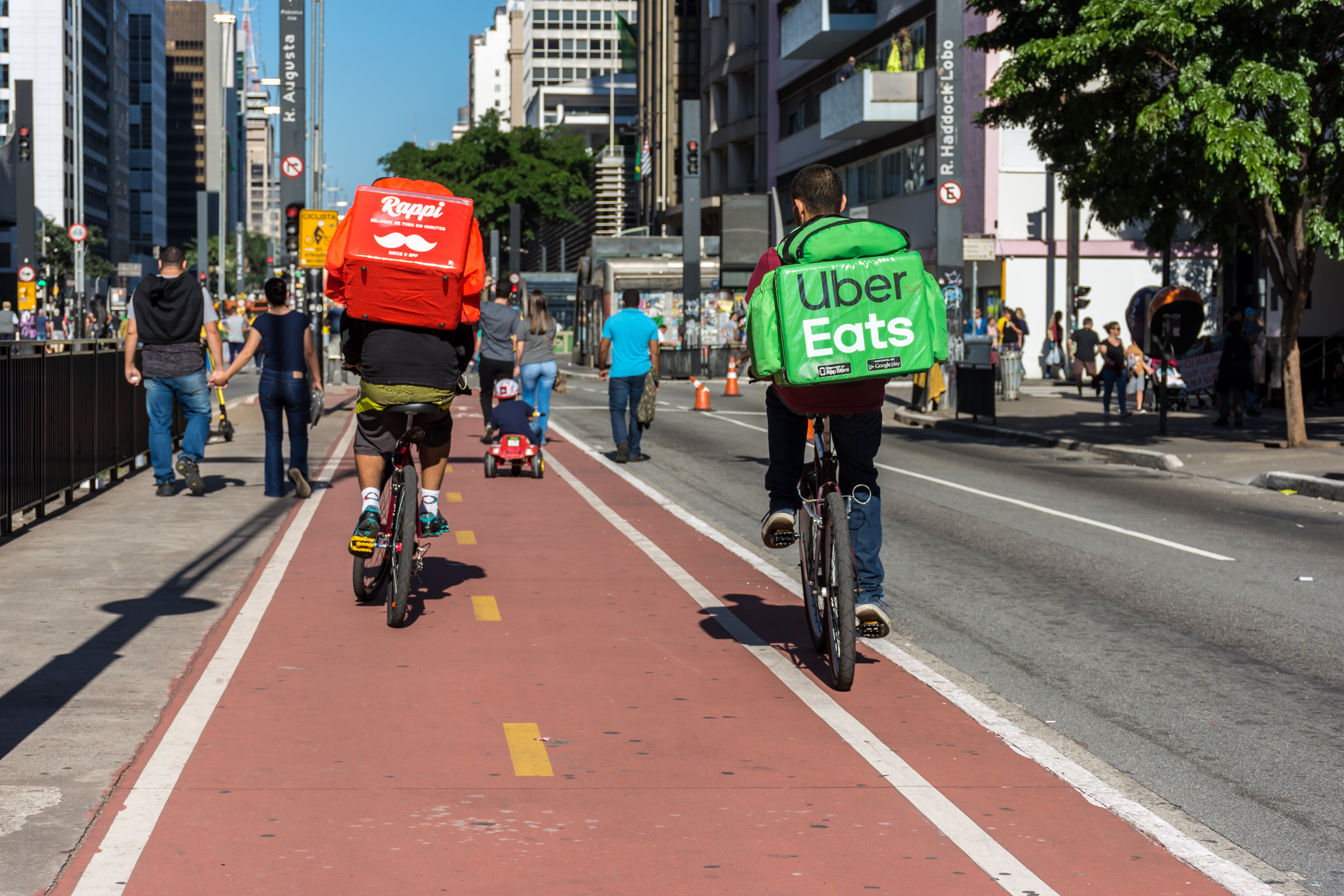
Brazil’s growing food delivery sector will be largely insulated from the effects of the ongoing Covid-19 pandemic and may even continue to grow, analysts have suggested.
Meanwhile, Brazil’s leading food delivery platforms iFood and UberEats have both been at the center of increased investment and expansion initiatives since the pandemic took hold. Following a failed attempt earlier this year to acquire British food delivery service JustEat, investment group Prosus is stepping up its efforts to purchase JustEat’s 33% share in iFood.
The deal, reportedly worth up to $1 billion, would increase Prosus’ stake in iFood significantly to 88%. This initiative represents the latest attempt by Prosus to consolidate and expand its stake in South America’s growing food delivery industry.
Uber, too, seems intent on expanding its reach. Through its UberEats platform, long-established as iFood’s primary competitor, Uber has announced an expansion into online grocery delivery in Brazil. The move follows Uber’s acquisition in late-2019 of South American grocery delivery app Cornershop, a service currently active across North and South America.
Recent expansion
Recent years have been marked by large-scale growth in Brazil’s food delivery market. iFood in particular has seen huge investment. In 2018, the company made headlines through its successful attempts to encourage an additional $400m investment from existing financial backers. The company then experienced a period of even greater growth.
iFood’s revenue reached $208m in 2019, with the company fielding 26 million orders per month across 900 cities throughout the year. As of December 2019, the foodservice industry as a whole across South America is worth $67.7bn, a growth of 1.5% on 2018.
Its success comes amid a growth in demand for increased food delivery options in Brazil. A 2019 report by the Brazilian Association of Bars and Restaurants found that online delivery had grown by 80% in 2018.
Growing pains
Such large-scale growth has had its problems. Worries over the impact of the growth of the delivery industry on labor relations and the workings of restaurants themselves are common. “The current challenge is the unequal relationship between restaurants and apps. High fees, arbitrary choice of restaurants within apps, a lack of contact with clients and problems with delivery drivers are some of the main issues,” says Brazilian consultant Marco Amatti FCSI, CEO of Mapa Assessoria.
In late 2019, iFood delivery drivers opted to strike in protest over issues of pay and working hours. Protestors called for a wage increase, a reduction in hours and a rest stop to be built into their shifts.
Critics of the industry have suggested the prevalence of food delivery apps has created a new type of employment position in Brazil. “To understand the delivery drivers’ strike, one must understand labor in Brazil. Those drivers have a new labor relation status that increases insecurity with regard to the availability of healthcare, social security provision, civil responsibility, and safety in the workplace,” says Amatti.
For many, the pandemic has heightened these issues. With Brazil particularly badly affected by the virus, unemployment rates have soared. The Brazilian government recently announced that over half of the working-age population is out of work. This has pushed more people into temporary, insecure delivery employment.
A new wave of strikes by delivery drivers took place earlier this month. Over a thousand iFood workers took to the streets in Sao Paolo, complaining that the app was requiring them to work longer hours for less pay.
Covid-19: crisis or opportunity?
The ongoing pandemic has had a particularly serious impact on the foodservice industry more generally. In the second quarter of 2020, figures from GlobalData reveal the restaurant industry across South America experienced a 29.9% decline in sales compared with the same quarter in 2019.
The food delivery industry seems set to be largely insulated from this decline. According to Mark Dempsey, consulting director at GlobalData, “The delivery market will be protected, and without a doubt has already played a major part around the world, not just in Latin America, in keeping the industry going.”
While physical visits to restaurants have plummeted in Brazil over the last three months – a recent Google mobility report found that visits to retail and recreation locations were down 35% compared to the baseline figure – demand for food delivery has soared. iFood has revealed that some users have been ordering up to 30% more food through their delivery system than before the pandemic.
The Brazilian market is particularly well-placed for the future. In 2018, Brazil ranked as having the fourth largest worldwide market in app downloads. With high levels of smartphone usage and established food delivery networks already in place, companies appear to be well positioned to meet increased demand.
As Brazil begins to ease lockdown restrictions, attention has turned to the future of the industry. “The delivery market will still grow, although probably in lower rates,” argues Amatti. “The current challenges are barriers to a sustainable picture.”
These are challenges the food delivery sector may well be able to overcome. Across South America, quick service restaurants (QSR), fast food outlets, and coffee and tea shops have seen lower levels of decline, in part because of the ease with which social distancing measures can be put in place and the ability of businesses to harness the food delivery market.
Dempsey suggests that, “those that can adapt quickly to the new circumstances will be the winners.” The food delivery sector may well give restaurants the ability to innovate and continue catering to their clients.
Further details:
To find out more about this burgeoning market, there is still time to register for FCSI’s ‘Future of Foodservice in Latin America’ webcast, which will be presented by GlobalData’s consulting director, Mark Dempsey and hosted by Michael Jones, editorial director of FCSI’s Foodservice Consultant magazine.
The webcast will give an overview of foodservice trends and inspirations across Latin America, and explore how the lockdown has affected its major countries and sectors.
Places are limited, so please register in advance, here.
Conor Carleton
